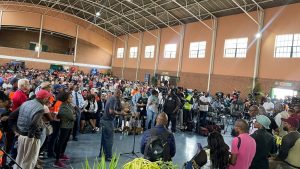Economist Iraj Abedian says a looming global recession due to the coronavirus pandemic has contributed to the decline in the rand.
South Africa has 116 cases of the virus that prompted the closure of schools, a ban on gatherings of more than 100 people. This has impacted the tourism and aviation sectors.
The rand breached its weakest closing level on record on Wednesday, trading at around R17.13 to the US dollar.
“We know we have our own growth problems even without COVID-19 then we have a global recession looming, China is talking about recession and China is one of our major trading partners.”
“When you get a global economy going into a recessionary mode, we are literally being forced to stop producing. We are paralysing the supply side of the economy, open economies like South Africa are vulnerable and our currency demonstrates that,” says Abedian.
Another torrid day at JSE
Earlier on Wednesday, the JSE experienced another torrid day with the all-share index plummeting another 7% amid continued worries about the global spread of the coronavirus.
Financial shares were worst affected. Many investors are fleeing to the US dollar as a safe haven. The price of oil has also continued to slip – with Brent crude trading as low as $26.37 a barrel. South Africa buys Brent Crude.
Rescue packages
Abedian says the government should encourage the banking sector and the Reserve Bank to offer rescue packages to businesses in order to keep the economy moving.
Many countries have announced stimulus packages in a bid to counter the economic impact of the outbreak. Abedian says the banking sector needs to support businesses.
“The governments don’t have to throw money at the problem. They could coordinate for example in South Africa and this is what I firmly believe needs to be done. They could coordinate between the banking sector and the Reserve Bank to do a mix of targeted rescue packages, substantially lower interest rates followed by the banking industry as a whole to suspend terms and conditions for the existing loans to support businesses that are growing for the next 12 to 18 months.
More on the developments around the Rand with Francis Herd:
Expectations of rates cut
The pressure is mounting on the South African Reserve Bank to cut interest rates as the impact of the coronavirus chokes economic activity. The Monetary Policy Committee is meeting on Thursday.
The Federal Reserve Board on Sunday implemented its second emergency interest rate cut in March, because of its increasingly dire predictions about the economic impact of the coronavirus.
The Fed cut its benchmark interest rate by a full percentage point to a range of zero to 0.25 %.
This was aimed at making it easier for banks to lend money to businesses facing a steep and sudden drop in revenue as the virus forces them to curtail their activity or shut down.
COVID-19 has engulfed the world and impacted imports, exports, tourism, air travel, business and economy.
Many countries have announced stimulus packages in a bid to counter its impact.
Share prices have fallen again in Europe and Asia. There are over 200 000 COVID-19 infections globally with over 8 000 deaths registered.
South Africa has 116 confirmed cases and no deaths.
On this video, President Cyril Ramaphosa calls on South Africans to help tackle COVID-19:
The number of COVID-19 cases in South Africa has risen to 116, with no deaths reported.

Loading…






